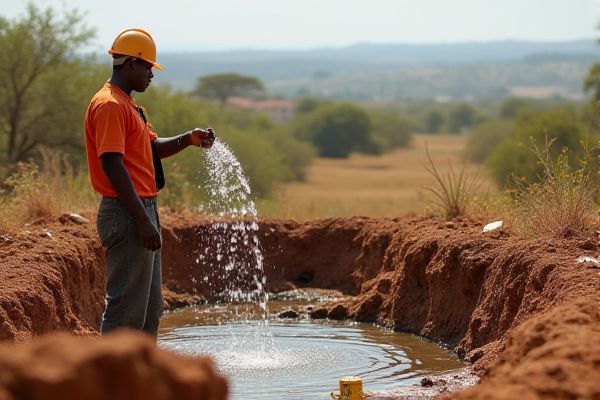
Ethiopia's water supply sector presents numerous job opportunities driven by the country's commitment to improving access to clean water and sanitation. Positions are available for engineers specializing in water resource management, technicians for maintenance of water supply systems, and project managers overseeing infrastructure development. NGOs and government agencies often seek skilled professionals for roles in community engagement and capacity building to enhance local water management skills. With ongoing investments in water infrastructure, the demand for qualified personnel continues to grow, providing a chance to contribute positively to public health and sustainable development.
Job Description
Water supply jobs in Ethiopia encompass roles focused on ensuring access to clean and safe drinking water for communities. Positions may include water resource management specialists, engineers, and field technicians, all working towards sustainable water supply solutions. Responsibilities often involve conducting site assessments, overseeing the installation of water systems, and collaborating with local authorities to address water-related challenges. Professionals in this field contribute significantly to public health and community development, improving living conditions and access to essential resources.
Requirement
Water supply jobs in Ethiopia often require candidates to have a background in environmental science, civil engineering, or a related field. Familiarity with water management practices and local regulations is essential for effectively addressing the unique challenges the country faces. Strong analytical skills, problem-solving abilities, and experience with community engagement can significantly enhance your chances of securing a position. Many employers also value knowledge of sustainable practices and previous work with international organizations or NGOs operating in Ethiopia.
Salary and Perks Expected
Water supply jobs in Ethiopia often offer competitive salaries that vary based on experience and qualifications. Entry-level positions may provide a starting wage around 6,000 to 8,000 Ethiopian Birr per month, while specialized roles can reach 15,000 Birr or more. Many organizations in this sector also include benefits such as health insurance and transportation allowances to support employee well-being. Your role in improving water supply can significantly impact local communities, contributing to both environmental sustainability and public health.
Similar Job Names
- Water Supply Engineer
- Water Resource Manager
- Hydrologist
- Water Quality Specialist
- Water Treatment Plant Operator
- Community Water Supply Coordinator
- Hydrogeologist
- Pumping Station Technician
- Water Supply Technician
- Environmental Engineer
- Project Manager for Water Projects
- Water Policy Analyst
- Sanitation Engineer
- Distribution Network Manager
- Water Access Facilitator
- Water Supply Data Analyst
- Water Infrastructure Planner
- Field Technician for Water Services
- Community Engagement Officer
- Groundwater Development Specialist
Job Expectation Concept
Water supply jobs in Ethiopia play a critical role in addressing the country's ongoing water accessibility challenges. These positions often involve planning, implementing, and managing water resource projects to ensure communities receive safe and reliable drinking water. Professionals in this sector may work with government agencies, NGOs, and local communities to develop sustainable solutions tailored to Ethiopia's diverse geographic and climatic conditions. Emphasizing skills in engineering, project management, and community engagement can significantly enhance your prospects in this vital field.
Career Advantage and Weakness
Water supply jobs in Ethiopia offer significant career advantages, including the opportunity to contribute to public health and community development. Professionals in this field can engage in meaningful work that directly impacts access to clean water, crucial for improving the quality of life. However, challenges such as inadequate infrastructure and funding can hinder progress and limit your potential in certain areas. Staying informed about local regulations and technological advancements can enhance your career prospects while navigating these obstacles.
Important Thing Must Know
Water supply jobs in Ethiopia offer various roles focused on enhancing access to clean water and improving sanitation services. These positions often involve working with local communities to identify needs, develop solutions, and implement sustainable water management practices. Knowledge of local regulations and standards is essential for ensuring compliance and effective project execution. Skills related to engineering, project management, and community engagement can significantly boost your employability in this sector. Opportunities exist within government agencies, non-governmental organizations, and private companies dedicated to water supply and public health initiatives.
Alternative Career Options
Ethiopia offers a variety of alternative career options within the water supply sector, catering to diverse skill sets and interests. Opportunities exist in roles such as water resource management, where professionals focus on the sustainable use and distribution of water resources. Engaging in community outreach or education programs can enhance public awareness of water conservation practices and hygiene. Technical positions, including engineering and maintenance roles, are essential for improving infrastructure and ensuring the delivery of safe drinking water to communities.
Companies List
- Ethiopian Petrolem Company
- Ethiopian Electric Utility
- Ethio Telecom
- Ethiopian Airlines
- Addis Ababa Water and Sewerage Authority
- Awash Basin Authority
- Ministry of Water and Energy
- Addis Ababa City Administration
- Aba Gerima Water Company
- Coca-Cola Beverages Africa Ethiopia
- Diageo Ethiopia
- Heineken Brewery Ethiopia
- Nestle Ethiopia
- Beverages Africa
- Ethiopian Development Fund
List of Ideal City
Ethiopia offers several cities that are ideal for water supply jobs, with significant employment opportunities in the sector. Addis Ababa, the capital, has a growing demand for professionals in water resource management due to urbanization and population growth. Another key city is Dire Dawa, which requires skilled workers to improve its water distribution systems and support sustainability initiatives. Mekelle also presents opportunities, especially for those interested in rural water supply projects aimed at enhancing access to clean water in underserved communities.
 jobs-ethiopia.com
jobs-ethiopia.com